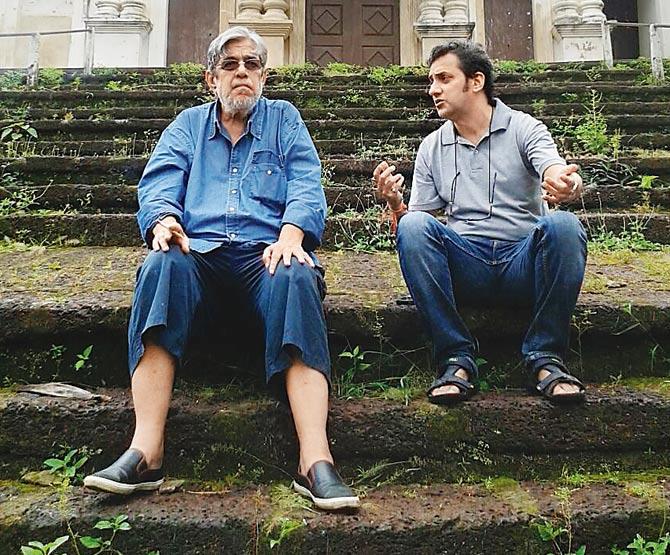A new documentary on auteur Saeed Mirza offers a glimpse into his ideology, and why he seeks refuge in Leh Ladakh

Kireet Khurana, Saeed Mirza and N Padmakumar in Ladakh
![]() "Leftism is inclusive. It does not discriminate between religion, caste, creed and ethnicity. That's poetry!" believes Saeed Mirza, one of India's most distinguished auteurs, who is now the subject of a 60-minute documentary, Saeed Mirza – The Leftist Sufi. Helmed by Kireet Khurana and N Padmakumar, the film unravels different facets of the FTII alumnus, considered a pioneer of the parallel cinema movement of the 1970s and 80s with films like Mohan Joshi Haazir Ho, Albert Pinto Ko Gussa Kyoon Aata Hai and Salim Langde Pe Mat Ro. This evening marks the film's premiere in Mumbai, as part of Osianama's ongoing festival at Liberty.
"Leftism is inclusive. It does not discriminate between religion, caste, creed and ethnicity. That's poetry!" believes Saeed Mirza, one of India's most distinguished auteurs, who is now the subject of a 60-minute documentary, Saeed Mirza – The Leftist Sufi. Helmed by Kireet Khurana and N Padmakumar, the film unravels different facets of the FTII alumnus, considered a pioneer of the parallel cinema movement of the 1970s and 80s with films like Mohan Joshi Haazir Ho, Albert Pinto Ko Gussa Kyoon Aata Hai and Salim Langde Pe Mat Ro. This evening marks the film's premiere in Mumbai, as part of Osianama's ongoing festival at Liberty.

Kireet Khurana, Saeed Mirza and N Padmakumar in Ladakh
"His film championed the cause of the underdogs, with feisty iconoclastic protagonists caught in the turmoil of the rigid society, which was becoming more defunct. Given the fact that Saeed is such an important figure in the film industry and there was not a single documentary made on him, it became imperative to chronicle his life and times. His charisma and eloquence helped in bringing out the lyricism of the film," says Khurana, who has previously helmed over 20 award-winning short films besides Toonpur Ka Superhero, touted as India's first live action-cum-3D animation film.

The filmmaker with Kireet Khurana in Goa
Scenes of time
Shot in Mumbai, Goa (Mirza's second home), Pune and Leh – Ladakh, the film revisits many locations that have appeared in Mirza's oeuvre, over three decades back. Khurana recollects, "It was a remarkable experience. In some locations where Mohan Joshi Haazir Ho was shot, the chawl was in worse condition. The cotton mills in Lower Parel (set for Albert Pinto Ko Gussa Kyoon Aata Hai) have given way to malls, completely obliterating the past, forgetting the millions who suffered in mill strikes and died in penury. Saeed strengthened much of his "leftist" ideology after visiting these grimy parts of Mumbai. Then, he would often go to Leh-Ladakh to find peace and his Sufism. Hence, the paradox in the title."
The film also features interviews with Kundan Shah and Sudhir Mishra, who started their careers with Mirza, and talk about his democratic approach to filmmaking, along with Mahesh Bhatt, who was inspired by the former's outlook and films. "Saeed has attacked ideologies and questioned ethical decisions but never been personal. And that's the greatness of the man," says Khurana, adding that the filmmaker liked the final cut and got to know himself better through the process. "That is a huge compliment for the team that worked on it," he sums up.
 Subscribe today by clicking the link and stay updated with the latest news!" Click here!
Subscribe today by clicking the link and stay updated with the latest news!" Click here!







